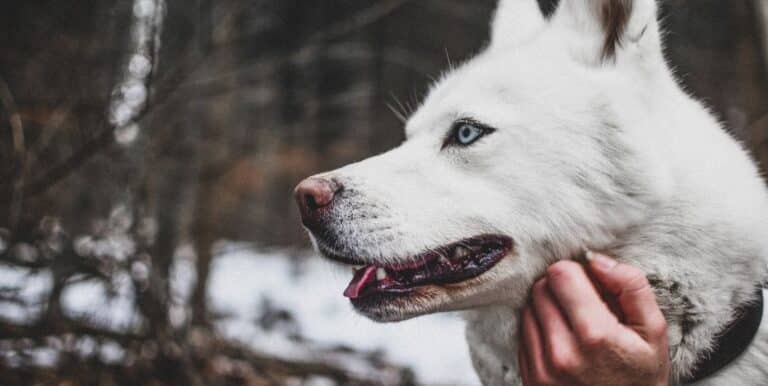Why do Dogs Howl at Sirens?

Although not all dogs howl at sirens, it is quite a common problem for owners. Howling is a form of communication, but it is not always easy to determine what the dog is trying to say; it may be a sign of distress or it may be intended as a signal to other dogs. Two main explanations for howling at sirens have been suggested. One is that the sound is painful to dogs and the other is that it is instinctive behavior: a response to a noise that sounds — to the dog — like another dog howling. The second theory is more generally accepted.
Canine Hearing and Pain Thresholds
The theory that sirens can cause pain or distress to dogs is based on the fact that they have much more sensitive hearing than humans and can detect a far wider range of sound frequencies. It may be that a sound that is merely annoying to humans is physically painful to a dog. There seem, however, to be many cases where dogs howl at sirens without showing any other sign of distress and may even appear to be quite happy while howling.

Canine Social Behavior and Communication
Dogs are social animals and regard their owners as members of their pack. A great deal of canine behavior is related to the maintenance of relationships within the pack, and with other packs. This can be traced back to the domestic dog’s wolf ancestry.
Howling is an integral part of wolf behavior. The sound carries much further than a bark and may be used by a lone wolf to locate other pack members. A howl can send a signal that says “I’m here!” and the respondent howl of other wolves may be a reply of “We’re over here!” Often, a group of wolves will howl together, seemingly to announce their presence to other packs and possibly as a way of defending their territory.
All domestic dogs are thought to be at least in part descended from wolves, so it seems very possible that they are displaying the same type of behavior. Some sirens sound like the faraway howl of a dog — at least to other dogs — and the dog may simply be sending a helpful reply. One howl often leads to another, which is why a whole neighborhood of dogs may howl in response.
Some dogs will howl in response to other stimuli, or sometimes for no obvious reason. It could be that the dog is bored or lonely and is trying to attract other pack members — in other words its owners — or other dogs for companionship. This is unlikely to be the case, however, if the dog howls only at sirens.

Many dog owners can tell amusing stories about their pets’ reactions to sirens. In one case, for example, it seems that two collies would run the length of an acre so that they could politely howl at the noon siren each day without annoying their owner. If interrupted, they would look very ashamed and stop immediately.
Factors Affecting Howling
The responses of dogs to sirens are very variable; some howl at all sirens, some only at certain types and some not at all. The noon sirens that are played in some towns in certain parts of the world seem to sound particularly dog-like and often prompt howling. Research seems to show that huskies, malamutes, and other wolf-like breeds, along with beagles and basset hounds, are among the most likely to howl. Even so, it differs between individual animals, perhaps due to circumstances, past experiences, and their relationships with their owners. Anecdotal evidence suggests that howling can be learned from other dogs.
Training a Dog Not to Howl at Sirens
Howling can be distressing for the dog owner and annoying to neighbors, so many owners have an interest in ways to prevent this behavior. One widely used method is desensitization and counter conditioning (DSCC). In the case of sirens, this would perhaps involve playing a recording of a siren at — initially — a very low volume, then gradually increasing the noise level over a period, so that the animal can get used to it gradually. Simultaneously, the “counter conditioning” part has the owner giving the dog a treat or engaging it in some enjoyable activity so that it will come to associate the siren with pleasant experiences. Owners can try this for themselves, but in some cases, professional help from a dog trainer might be needed.






